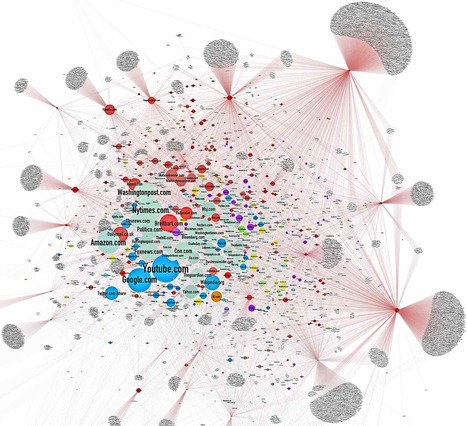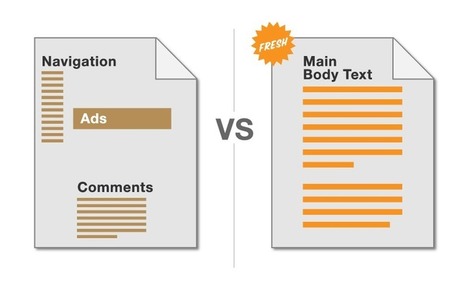 Your new post is loading...
 Your new post is loading...
You may know how to use Google’s basic search functions, but I bet you’ve never used these advanced tricks for market research. Here are 7 amazing google search tricks you can use! You’re using Google every single day. But I bet you’re only doing basic searches. In this video I share with you seven advanced Google queries that you ought to know....
The Whole Foods acquisition by Amazon weeks ago was only the latest milepost in the latter’s inexorable march to the top of retail. The company sold $136 billion worth of products in 2016 – more than any other online retailer (and just over a third of what Wal-Mart did).
And we find that Amazon is big and gaining on Google for product-related searches (be they early or late in the purchase journey). This means that more and more purchase journeys will start on Amazon’s home page, and proceed via search to a variety of product pages all the way to a sale.
This changes a lot of things, but the upshot – to my mind – will be a massive outlay in product content and product-related experiences by manufacturers.
Google is demoting misleading and offensive content in its search by updating algorithms and offering users new ways to report bad results. The change follows increased attention to flaws in top search results, including the promotion of fake news — and deliberately misleading or false information formatted to look like news — during the 2016 presidential election. Google said it has updated its algorithms to better prioritize “authoritative” content. Content may be deemed authoritative based on signals such as affiliation of a site with a university or verified news source, how often other sites link to the site in question and the quality of the sites that link. “We’ve adjusted our signals to help surface more authoritative pages and demote low-quality content, so that issues similar to the Holocaust denial results that we saw back in December are less likely to appear,” writes Ben Gomes, Google’s executive in charge of search, in a blog post published today....
Are Jews evil? It’s not a question I’ve ever thought of asking. I hadn’t gone looking for it. But there it was. I press enter. A page of results appears. This was Google’s question. And this was Google’s answer: Jews are evil. Because there, on my screen, was the proof: an entire page of results, nine out of 10 of which “confirm” this. The top result, from a site called Listovative, has the headline: “Top 10 Major Reasons Why People Hate Jews.” I click on it: “Jews today have taken over marketing, militia, medicinal, technological, media, industrial, cinema challenges etc and continue to face the worlds [sic] envy through unexplained success stories given their inglorious past and vermin like repression all over Europe.” Google is search. It’s the verb, to Google. It’s what we all do, all the time, whenever we want to know anything. We Google it. The site handles at least 63,000 searches a second, 5.5bn a day. Its mission as a company, the one-line overview that has informed the company since its foundation and is still the banner headline on its corporate website today, is to “organise the world’s information and make it universally accessible and useful”. It strives to give you the best, most relevant results. And in this instance the third-best, most relevant result to the search query “are Jews… ” is a link to an article from stormfront.org, a neo-Nazi website. The fifth is a YouTube video: “Why the Jews are Evil. Why we are against them.”...
The implication is that Google measures all of your documents for freshness, then scores each page according to the type of search query.
Singhal describes the types of keyword searches most likely to require fresh content:
Recent events or hot topics: “occupy oakland protest” “nba lockout”
Regularly recurring events: “NFL scores” “dancing with the stars” “exxon earnings”
Frequent updates: “best slr cameras” “subaru impreza reviews”
Google may determine exactly which queries require fresh content by monitoring the web and their own huge warehouse of data, including:
Search volume: Are queries for a particular term spiking (i.e. “Earthquake Los Angeles”)?
News and blog coverage: If a number of news organizations start writing about the same subject, it’s likely a hot topic.
Social media: A spike in mentions of a particular topic may indicate the topic is “trending.”
While some queries need fresh content, other search queries may be better served by older content.
Fresh is often better, but not always. (More on this later.)
Below are ten ways Google may determine the freshness of your content. Images courtesy of my favorite graphic designer, Dawn Shepard....
According to comScore’s most recent desktop search engine rankings, “Google Sites led the explicit core search market in February with 64 percent of search queries conducted.” In an overall sense, this proves one thing to be true: Google has captured the majority of search traffic.
However, you don’t want to ignore the other 36 percent. Here is a breakdown of the search engines that make up the “best of the rest.” - Microsoft sites: 21.4 percent
- Yahoo sites: 12.2 percent
- Ask Network: 1.6 percent
- AOL: 0.9 percent.
These numbers are nowhere as extensive as Google’s, but it does show that people are using other search engines....
If you’re like me, you probably use Google many times a day. But chances are, unless you're a technology geek, you probably still use Google in its simplest form. If your current use of Google is limited to typing in a few words and changing your query until you find what you’re looking for, then I’m here to tell you that there’s a better way -- and it’s not hard to learn.
On the other hand, even if you are a technology geek and can use Google like the best of them already, I still suggest you bookmark this article of advanced Google search tips. Then, you’ll then have the tips on hand when you're ready to pull your hair out in frustration watching a neophyte repeatedly type in basic queries in a desperate attempt to find something.
The following advanced Google search tips are based on my own experience and things that I actually find useful. I’ve kept the descriptions of the search tips intentionally terse, as you’re likely to grasp most of these simply by looking at the example from Google anyway.
As concerns over the de facto monopoly status of Google continue to grow, I'm reminded of the great philosopher Herman Cain and his infamous line "blame yourself". As long as "Google" is a generic phrase for Internet search, their dominant position is assured. That said, you can do something about it.
There are plenty of Google alternatives and many of these players offer a better search experience, depending on your needs. Here are 12 alternatives to escape your reliance on Google for all things search....
|
Fei-Fei Li, chief scientist of artificial intelligence and machine learning at Google Cloud, came on stage at Google’s Next Cloud conference today to talk about the current and next-generation applications of AI that Google’s working on. These technologies will make a difference in self-driving cars and healthcare, sure, but also Snapchat’s filters and Google Photos’ search capabilities. But the big highlight came when she announced a new way to allow software to parse video.
This new “Video Intelligence API” was demoed onstage, and it offered the kind of “whoa” moment you expect from a Google keynote. By playing a short commercial, the API was able to identify the dachshund in the video, when it appeared in the video, and then understand that the whole thing was a commercial. In another demo, we saw a simple search for “beach” and was able to find videos which had scenes from beaches in them, complete with timestamps. That’s similar to how Google Photos lets you search for “sunset” and pull up your best late-day snapshots.
Before now, computers couldn’t really understand the content of a video directly without manual tagging. “We are beginning to shine light on the dark matter of the digital universe,” Li said. At least in Google’s demo, it was genuinely impressive. And Google is making the API available to developers, just as it has with its other machine learning APIs.
Using Google seems straightforward enough. You enter in a search, and in return, Google gives you a list of web pages that help you find what you’re looking for. Right? Wrong. In 2016, 85% of Google searches contained significant additional elements beyond just a list of web pages, including bright, bold, click-attracting features that take up some of the most valuable real estate on the results page. Collectively, these features are known as "universal search." If you and your brand are only doing SEO for the standard "10 blue links" that comprise the web pages, you’re losing out. Currently, the universal search portfolio has more than 10 different features, including the knowledge graph, image bars, quick answer boxes, local packs and video snippets. Let’s look at three of the most common examples — and how you can leverage them for your brand.The Knowledge Graph The knowledge graph is a box filled with information that sits prominently at the top of the right side of the search results page. It appeared in 19.19% of total desktop searches, and 20.83% of mobile queries in 2016. Google pulls in information for the knowledge graph from several places across the web. There a few ways for brands to influence that information:...
When Twitter user Rory Cellan-Jones asked Google Home if Barack Obama is planning a coup, the digital assistant device responded by detailing a bogus conspiracy theory about the former president plotting a communist scheme to take over the government.
"According to details exposed in Western Centre for Journalism's exclusive video, not only could Obama be in bed with the communist Chinese, but Obama may in fact be planning a communist coup d'état at the end of his term in 2016," the smart home device's robotic voice explained, though it stumbled over the word "d'etat."
But this outlandish response isn't restricted to Google Home. Rather, it highlights a problem with how the search engine responds to queries in the form of "featured snippets" — short, direct answers highlighted at the top of its search results....
If desktop search is the first trillion, and mobile search is the second trillion, where will we find the third trillion?
Well, for a start, there is some growth still to come even in searches like those that people are already doing even in the most mature markets - the best argument I have for that is this chart which shows the growth of e-commerce, and how all of Amazon’s growth fits into around 8% of the total retail market. Just as e-commerce has further to go, so there is still untapped search demand.
But that’s going to be slow going - it’s not going to add a trillion / year any time soon.
So what might?
Well, my theory is that it’s going to come from searches people aren’t doing yet.
Here’s some data and evidence...
Since I noted Timothy Tuttle of Mindmeld’s LSA16 comments about the sudden increase in the volume of voice search queries, I’ve noticed an increasing number of articles on the subject. If the attention being given voice search is an indication of its anticipated impact on the marketplace, then it’s going to be a big deal. The potential for voice search to become a major search medium is well illustrated by the number of slides Mary Meeker devotes to the topic in her annual Internet Trends report that was just released this month. Out of 213 slides, Mary included 23 slides on voice search. And while the numbers on voice search growth vary quite widely, they all agree on one trend: explosive growth. Explosive growth and the reason behind itAt LSA 16, Tuttle shared that within one year (last year), the use of voice search went from a statistical zero to 10 percent of all search volume. That was huge. Yet more recent numbers show that growth accelerating — Google announced at I/O that 20 percent of all searches have voice intent, while Meeker’s charts show that in May 2016, 25 percent of searches on Windows 10 taskbar are voice searches....
If you’re like me, you probably use Google many times a day. But chances are, unless you're a technology geek, you probably still use Google in its simplest form. If your current use of Google is limited to typing in a few words and changing your query until you find what you’re looking for, then I’m here to tell you that there’s a better way -- and it’s not hard to learn. On the other hand, even if you are a technology geek and can use Google like the best of them already, I still suggest you bookmark this article of advanced Google search tips. Then, you’ll then have the tips on hand when you're ready to pull your hair out in frustration watching a neophyte repeatedly type in basic queries in a desperate attempt to find something. The following advanced Google search tips are based on my own experience and things that I actually find useful. I’ve kept the descriptions of the search tips intentionally terse, as you’re likely to grasp most of these simply by looking at the example from Google anyway....
Google is so entrenched when it comes to finding information on the internet, we named the act after it. However, there are a ton of other tools and tricks that can get you answers to your question when Google doesn't have the answer.
Google does a great job of searching web sites, and it's no slouch in the field ofinstant answers, either. However, not every question can be answered by the first page of results. Here are some other resources you should include in your repertoire, as well as what they're useful for....
Most people on the Web seem to act like an ostrich. They stick their head into the sand because of the approaching end of search. It’s been increasingly visible all over the place for years.
Whether it’s mobile or local searches: googling is not about search anymore in many cases.
In 2015 it’s also time for search in general to reflect Google’s new approach to the Web. It’s all UGC (User Generated Content) Google can use.
I’ve written a few times over the recent years how Google becomes increasingly “ads only” or mimics their own personal assistant app called Google Now in that it only offers answers instead of search results. Both tendencies become increasingly apparent with almost each new Google feature or interface update....
|



 Your new post is loading...
Your new post is loading...





























More Neil Patel knowledge to help you use Google search better.